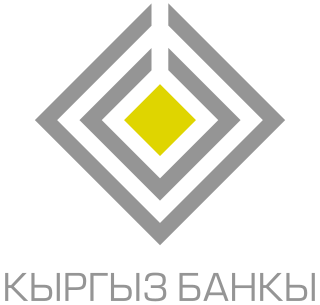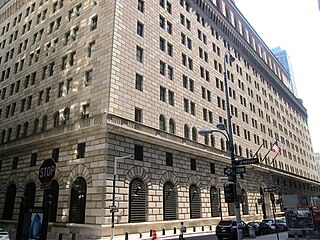Related Research Articles

Nordea Bank Abp, commonly referred to as Nordea, is a Nordic financial services group operating in northern Europe with headquarters in Helsinki, Finland. The name is a blend of the words "Nordic" and "idea". The bank is the result of the successive mergers and acquisitions of the Finnish, Swedish, Danish, and Norwegian banks of Merita Bank, Nordbanken, Unidanmark, and Christiania Bank og Kreditkasse that took place between 1997 and 2001. The Nordic countries are considered Nordea's home market, having finalised the sales of their Polish bank in 2014, Baltic operations in 2019 and completed the exit from Russia in early 2022 following a 2019 decision to close the business there. Nordea is listed on Nasdaq Nordic exchanges in Helsinki, Copenhagen, and Stockholm and Nordea ADR is listed in the US.

Kyrgyzstan, officially the Kyrgyz Republic, is a landlocked country in Central Asia, lying in the Tian Shan and Pamir mountain ranges. Bishkek is the capital and largest city. Kyrgyzstan is bordered by Kazakhstan to the north, Uzbekistan to the west, Tajikistan to the south, and China to the east and southeast. Ethnic Kyrgyz make up the majority of the country's over 7 million people, followed by significant minorities of Uzbeks and Russians.

Swedbank AB is a Nordic-Baltic banking group based in Stockholm, Sweden, offering retail banking, asset management, financial, and other services. Swedbank has a leading presence in Estonia and has a strong presence in Latvia and Lithuania.

Danske Bank A/S is a Danish multinational banking and financial services corporation. Headquartered in Copenhagen, it is the largest bank in Denmark and a major retail bank in the northern European region with over 5 million retail customers. Danske Bank was number 454 on the Fortune Global 500 list for 2011. The largest shareholder with 21% of the share capital is A.P. Moller Holding, the investment holding company of the Maersk family.

Kurmanbek Sali uulu Bakiyev is a Kyrgyz politician who served as the second president of Kyrgyzstan from 2005 until his removal from office as a result of the Kyrgyz Revolution of 2010, forcing Bakiyev to flee the country.
Asia Universal Bank (AUB) was a Kyrgyz commercial bank, which held about a quarter of the combined assets and deposits reported by the entire Kyrgyz banking system. The bank was highly regarded internationally, and received a number of awards, from organizations such as The Banker, Global Finance, The Asian Banker and Euromoney, but subsequently fell from grace.

Valērijs Belokoņs or Valeri Belokon is a Latvian businessman. He is a majority shareholder and chairman of the supervisory board of Baltic International Bank; a former co-owner of Blackpool F.C. From 12 January 2010 to 4 June 2013, he served as a Trustee of The Prince's Foundation for Building Community.

Rietumu Banka is the largest Latvian capital bank and one of the four largest commercial banks operating in the country.

The National Bank of the Kyrgyz Republic is the central bank of Kyrgyzstan and is primarily responsible for the strategic monetary policy planning of the country as well as the issuance of the national currency, the Som.
AS PrivatBank is a credit institution registered in Latvia as joint stock company and received its banking license on 31 July 1992.

FBME Bank was an international commercial bank. It offered commercial banking services and products to corporate and individual clients. Its traditional banking lines included international payment services, multi-currency account, credit facilities, trade finance, forex trading facilities, internet banking and international card services. FBME serviced clients worldwide.
Latvijas Krājbanka was a Latvian bank listed on the Riga OMX exchange.
Re Bank of Credit and Commerce International SA [1998] AC 214 is a UK insolvency law case, concerning the taking of a security interest over a company's assets and priority of creditors in a company winding up.

ABLV Bank was one of the largest private banks in the Baltic States, headquartered in Riga, Latvia with representative offices abroad from 1993 to 2018.

Despite having a strong legal framework, there still exists a huge gulf in Kyrgyzstan between the law and its implementation. Kyrgyzstan’s rampant corruption which penetrates all levels of society, including the presidency, eventually caused the Tulip Revolution in 2005, overthrowing Askar Akayev, and the 2010 Kyrgyzstani revolution, ousting Kurmanbek Bakiyev from office.

Parex Bank was a Latvian bank founded in 1992 by Valērijs Kargins and Viktors Krasovickis as a privately owned full-service banking company in Riga, Latvia that was very dominant in currency exchange in the 1990s. It had local and international clients in both the West and Russia with close ties to the Tambovskaya Russian mafia in St Petersburg and Vladimir Putin.

In 2014, $1 billion disappeared from three Moldovan banks: Banca de Economii, Unibank and Banca Socială. This bank fraud was a coordinated effort involving all three banks working together to extract as much loan finance as possible from the banks without any obvious business rationale. Ilan Shor, a Moldovan businessman, together with Vladimir Plahotniuc and Serghei Iaralov "masterminded" the scam. Shor was chairman of the board at Banca de Economii up to November 28, 2014.

The Bangladesh Bank robbery, also known colloquially as the Bangladesh Bank cyber heist, was a theft that took place in February 2016. Thirty-five fraudulent instructions were issued by security hackers via the SWIFT network to illegally transfer close to US$1 billion from the Federal Reserve Bank of New York account belonging to Bangladesh Bank, the central bank of Bangladesh. Five of the thirty-five fraudulent instructions were successful in transferring US$101 million, with US$81 million traced to the Philippines and US$20 million to Sri Lanka. The Federal Reserve Bank of New York blocked the remaining thirty transactions, amounting to US$850 million, due to suspicions raised by a misspelled instruction. As of 2018, only around US$18 million of the US$81 million transferred to the Philippines has been recovered, and all the money transferred to Sri Lanka has since been recovered. Most of the money transferred to the Philippines went to four personal accounts, held by single individuals, and not to companies or corporations.
The Russian Laundromat was a scheme to move $20–80 billion out of Russia from 2010 to 2014 through a network of global banks, many of them in Moldova and Latvia. The Guardian reported that around 500 people were suspected of being involved, many of whom were wealthy Russians. The money laundering scheme was uncovered by Global Laundromat, an investigation. The New Yorker says that that operation was known as "The Russian Laundromat," "The Global Laundromat," or "The Moldovan Scheme." The Herald wrote that the scheme is "thought to be the world's biggest and most elaborate money-laundering scheme."
The FinCEN Files are documents from the U.S. Treasury's Financial Crimes Enforcement Network (FinCEN), that have been leaked to BuzzFeed News and then shared with the International Consortium of Investigative Journalists (ICIJ), and published globally on 20 September 2020. The 2,657 leaked documents include 2,121 suspicious activity reports (SARs) covering over 200,000 suspicious financial transactions between 1999 and 2017 valued at over US$2 trillion by multiple global financial institutions.
References
- ↑ "Grave Secrecy: How a Dead Man Can Own a UK Company and Other Hair-raising Stories About Hidden Company Ownership From Kyrgyzstan and Beyond" (PDF). Global Witness . June 2012. p. 49. Retrieved 24 July 2021.
- ↑ "Kyrgyzstan: Banking Tussle Nearing Resolution?". EurasiaNet.org. 2013-09-26. Retrieved 2016-09-05.
- ↑ "LSM / Banker eyes foreign Kyrgyz assets after arbitration / Eng.lsm.lv". Lsm.lv. Retrieved 2016-09-05.
- ↑ Nina Kolyako, BC, Riga, 13.06.2011.Print version (2011-06-13). "Manas Bank: Kyrgyzstan's international manhunt of bank officials is illegal :: The Baltic Course | Baltic States news & analytics". The Baltic Course. Retrieved 2016-09-05.
{{cite web}}: CS1 maint: multiple names: authors list (link) CS1 maint: numeric names: authors list (link) - ↑ UNCITRAL Arbitral Award in the matter of Belokon v Kyrgyz Republic dated 24 October 2014: https://www.italaw.com/sites/default/files/case-documents/ITA%20LAW%207008_0.pdf
- ↑ Judgment of the Paris Court of Appeal dated 21 February 2017 in the matter of Belokon v Kyrgyz Republic: https://www.italaw.com/sites/default/files/case-documents/italaw8476.PDF
- ↑ "Blackpool FC, a Kyrgyzstan money-laundering conviction and a non-takeover". TheGuardian.com . 18 October 2018.
- ↑ Judgment of the Paris Court of Appeal dated 21 February 2017 in the matter of Belokon v Kyrgyz Republic: https://www.italaw.com/sites/default/files/case-documents/italaw8476.PDF